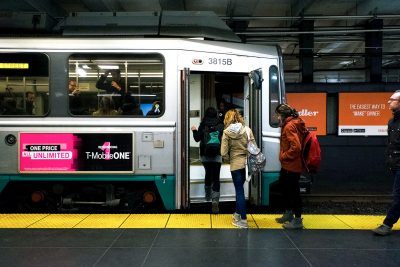
The MBTA spent more on overtime pay last year than previous years, citing its aggressive capital improvement program as one of the contributing factors.
The transportation agency spent nearly $82 million on overtime pay last year, according to The Boston Globe. This amount was almost 30 percent higher than in 2016, 2014 and 2013.
MBTA spokesman Joe Pesaturo wrote in an email that the cost of overtime pay was higher in 2018 because of the agency’s capital improvement program, significant weather events in January and February and the World Series parade.
Other reasons listed for overtime payment were for the demolition and reconstruction of sections of the T lines.
“Other projects that sometimes required hiring workers on overtime included: the demolition and reconstruction of Wollaston Station, track work on Commonwealth Avenue, floating slabs (rail bed) work between Harvard and Alewife, track work at the Fenway tunnel portal, and system-wide power and signal work,” Pesaturo wrote.
Pesaturo wrote that the cost for overall payroll was lower in 2018 than in 2017 because of efficient management.
“The MBTA credits operating more efficiently, effective management techniques, and a reduced rate of unscheduled absences among bus and train operators,” he wrote. “Additionally, there were some vacant positions in 2018 that are being filled this year.”
Starting in July 2018, the MBTA began a five-year plan that involves investing $8 billion into expansion and repair projects.
“Today, the T is much better at getting money out the door,” Pesaturo wrote. “And we now have a much more robust pipeline for projects — MBTA capital contract awards more than doubled between FY17 and 18.”
In 2018, there was a 132 percent increase in construction costs for projects including repairs to the D branch of the Green Line track, Pesaturo wrote.
“This $74 million project is part of the MBTA initiative to bring the Green Line track and signal systems into a State of Good Repair,” Pesaturo wrote. “Workers are replacing replace approximately 6.5 miles of signal infrastructure and 25,000 feet of track.”
Pesaturo also explained that the cost for overtime for engineering and maintenance department workers is higher than in the Capital program.
“[Engineering and Maintenance] overtime work is funded through both capital and operating budgets,” Pesaturo wrote. “[Overtime] within the Capital program was $27m and within the Operating Fund (which includes Engineering and Maintenance personnel) was $55m. Capital program OT was $15.6m in calendar 2017.”
Pesaturo wrote that the MBTA will only use overtime when it is necessary, and that the management will use the workforce effectively.
“The MBTA will continue to manage its workforce effectively,” Pesaturo wrote, “and only use overtime work when it’s necessary to fulfill the T’s mission of providing consistently reliable transit services.”
Nipawan Waisayanand, 37, of Kenmore, said she thinks improving infrastructure is good for the people, but that the potentially long overtime hours for workers may be a concerning issue.
“It might affect the worker that [works] overtime,” Waisayananad said.
Megan Birgy, 23, of Allston, said she thinks the public will benefit from the MBTA’s capital improvement program.
“I mean, if they’re working overtime, there’s probably a way to more efficiently manage their time,” Birgy said. “But I think that investing in public transit is something that everyone can benefit from, so it’s an important thing to spend money on.”










